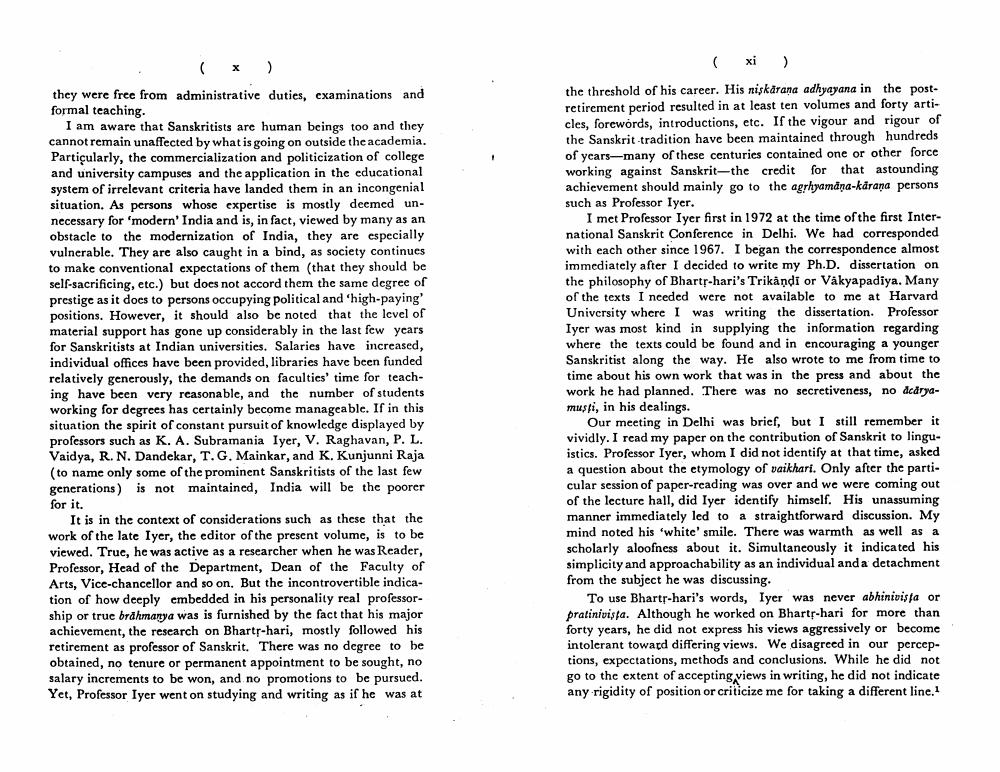Book Title: Foreword Author(s): Ashok Aklujkar Publisher: Ashok Aklujkar View full book textPage 2
________________ ( xi ) they were free from administrative duties, examinations and formal teaching. I am aware that Sanskritists are human beings too and they cannot remain unaffected by what is going on outside the academia. Particularly, the commercialization and politicization of college and university campuses and the application in the educational system of irrelevant criteria have landed them in an incongenial situation. As persons whose expertise is mostly deemed unnecessary for 'modern' India and is, in fact, viewed by many as an obstacle to the modernization of India, they are especially vulnerable. They are also caught in a bind, as society continues to make conventional expectations of them (that they should be self-sacrificing, etc.) but does not accord them the same degree of prestige as it does to persons occupying political and 'high-paying' positions. However, it should also be noted that the level of material support has gone up considerably in the last few years for Sanskritists at Indian universities. Salaries have increased, individual offices have been provided, libraries have been funded relatively generously, the demands on faculties' time for teaching have been very reasonable, and the number of students working for degrees has certainly become manageable. If in this situation the spirit of constant pursuit of knowledge displayed by professors such as K. A. Subramania Iyer, V. Raghavan, P. L. Vaidya, R. N. Dandekar, T. G. Mainkar, and K. Kunjunni Raja (to name only some of the prominent Sanskritists of the last few generations) is not maintained, India will be the poorer for it. It is in the context of considerations such as these that the work of the late Iyer, the editor of the present volume, is to be viewed. True, he was active as a researcher when he was Reader, Professor, Head of the Department, Dean of the Faculty of Arts, Vice-chancellor and so on. But the incontrovertible indication of how deeply embedded in his personality real professorship or true brahmanya was is furnished by the fact that his major achievement, the research on Bharts-hari, mostly followed his retirement as professor of Sanskrit. There was no degree to be obtained, no tenure or permanent appointment to be sought, no salary increments to be won, and no promotions to be pursued. Yet, Professor Iyer went on studying and writing as if he was at the threshold of his career. His niskarana adhyayana in the postretirement period resulted in at least ten volumes and forty articles, forewords, introductions, etc. If the vigour and rigour of the Sanskrit tradition have been maintained through hundreds of years-many of these centuries contained one or other force working against Sanskrit-the credit for that astounding achievement should mainly go to the agrhyamana-kdrana persons such as Professor Iyer. I met Professor Iyer first in 1972 at the time of the first International Sanskrit Conference in Delhi. We had corresponded with each other since 1967. I began the correspondence almost immediately after I decided to write my Ph.D. dissertation on the philosophy of Bhartr-hari's Trikandi or Vakyapadiya. Many of the texts I needed were not available to me at Harvard University where I was writing the dissertation. Professor Iyer was most kind in supplying the information regarding where the texts could be found and in encouraging a younger Sanskritist along the way. He also wrote to me from time to time about his own work that was in the press and about the work he had planned. There was no secretiveness, no daryamusti, in his dealings. Our meeting in Delhi was brief, but I still remember it vividly. I read my paper on the contribution of Sanskrit to linguistics. Professor Iyer, whom I did not identify at that time, asked a question about the etymology of vaikhari. Only after the particular session of paper-reading was over and we were coming out of the lecture hall, did Iyer identify himself. His unassuming manner immediately led to a straightforward discussion. My mind noted his 'white' smile. There was warmth as well as a scholarly aloofness about it. Simultaneously it indicated his simplicity and approachability as an individual anda detachment from the subject he was discussing. To use Bharts-hari's words, Iyer was never abhinivisja or pratinivista. Although he worked on Bhartr-hari for more than forty years, he did not express his views aggressively or become intolerant toward differing views. We disagreed in our perceptions, expectations, methods and conclusions. While he did not go to the extent of accepting views in writing, he did not indicate any rigidity of position or criticize me for taking a different line.Page Navigation
1 2 3 4 5 6
